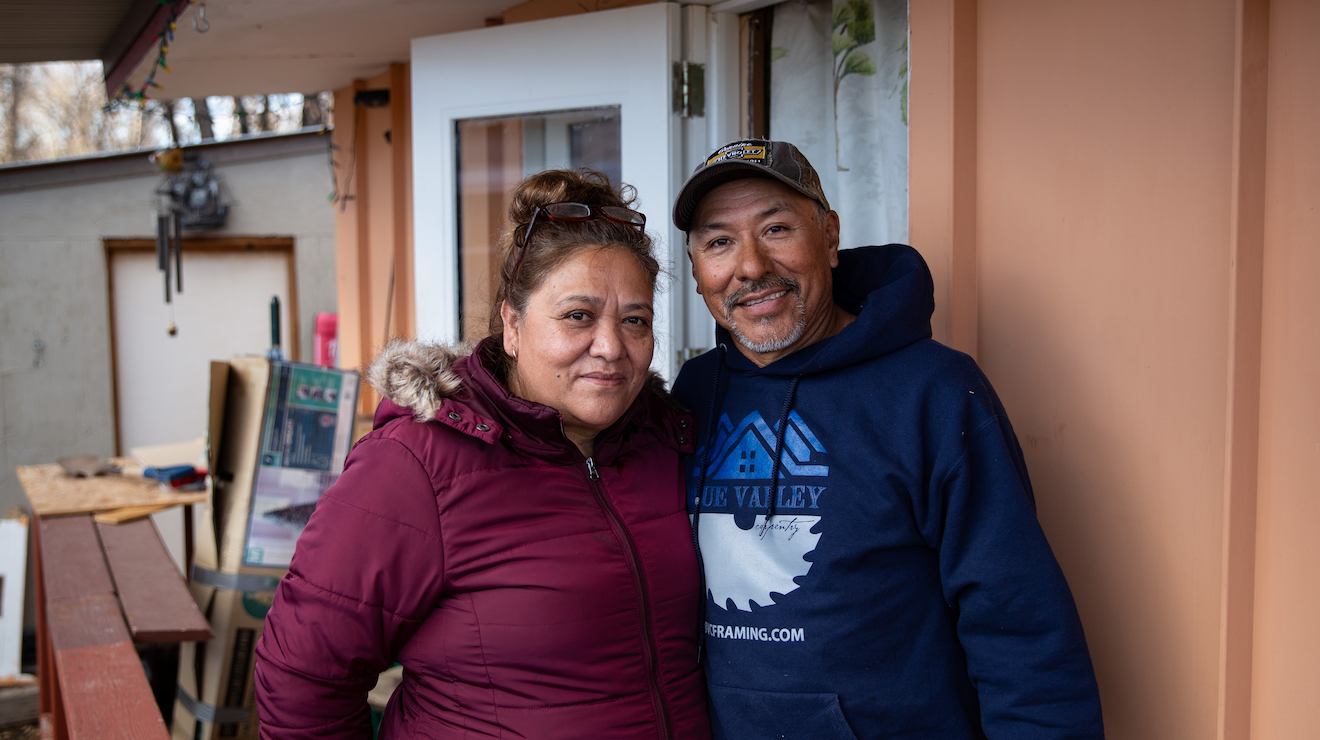
Gregorio Luna and his wife Pilar at Country Meadows Mobile Home Park in Gunnison, Colo. in 2020. Photos by Luna Anna Archey
Gregorio Luna and his wife Pilar at Country Meadows Mobile Home Park in Gunnison, Colo. in 2020. Photos by Luna Anna Archey
On May 4, 2022, Elizabeth McGee walked out of her trailer in the former Country Meadows Mobile Home Park, two miles north of Gunnison, a town of almost 7,000 near the ski town of Crested Butte, and saw a notice, dated April 29, taped to the fence.
“We are writing to inform you that the Country Meadows Mobile Home Park has been sold and the name is being changed to ‘Ski Town Village’.” The notice also included the news that, starting July 1, 2022, the rent for each lot would be increasing to $725 from $425—a 70% raise.
McGee, who is 42, has lived in Gunnison off and on for more than 30 years. Last August, she moved into her cousin’s trailer in Country Meadows, taking over the house payments—$450 per month plus the $425 per month to rent the lot. For McGee, who works as the seafood manager at the local City Market grocery store, it was a good deal compared to the $900-per-month plus utilities she was paying for a small two-bedroom apartment with no yard.
Soon after McGee read the notice, she called the phone number listed on the piece of paper. No answer. The name of the company on the voicemail, Cloud Peak Equity LLC, didn’t even match the new owner’s company name, Ski Town Village LLC, but she left a message anyway, expressing that Country Meadow residents would like to get to know the new owner, John Romero, and share their concerns.
Two days later, he called her back and reiterated that the rent was going up. Romero, McGee remembered, told her, “It’s like going to the grocery store. You see a price on the meat and you can buy it or walk away.” (Romero did not respond to multiple requests for comment.)
Across the state, skyrocketing home prices and rents are also driving up prices for Colorado’s estimated 900 mobile home parks, historically the largest stock of non-subsidized affordable housing for over 100,000 Coloradans. Amid a booming housing market in rural mountain communities like Gunnison, Country Meadows residents tried to organize and purchase the park for themselves. The resulting saga was a case study on what happens when new corporate owners cash in on mobile home parks and what it means for the people who live there.
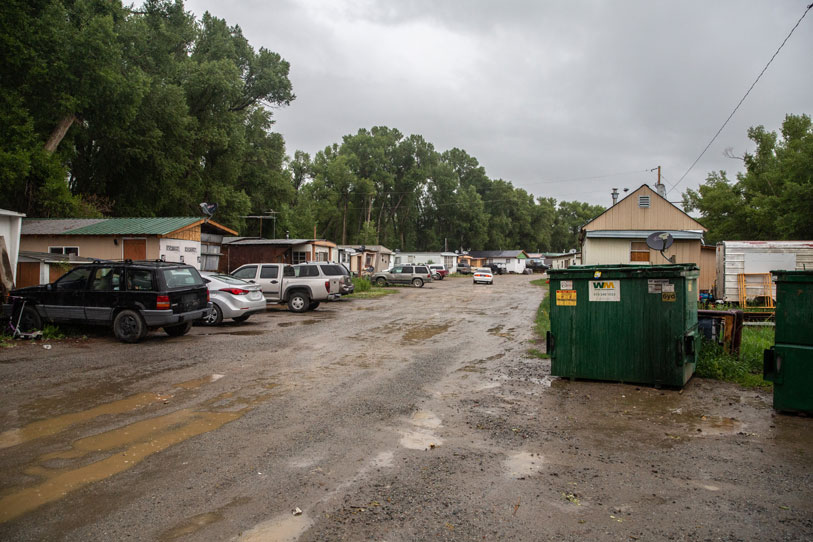
Country Meadows Mobile Home Park in June 2022.
***
Gregorio Luna lives in a peach-colored trailer with a small deck and a shaded yard in the back row of Country Meadows. An animated 58-year-old with a salt and pepper goatee, Luna ended up at Country Meadows because it was one of the few housing options in Gunnison that he could afford. A construction worker who came to the U.S. from Mexico 37 years ago, he had spent years building everything from giant Walmarts to condo developments, but when he arrived in Gunnison in 2014, he had just $700 in cash. The 2008 financial crisis and tens of thousands of dollars he’d paid in immigration fees for his wife and kids’ green cards had drained his savings.
His daughter lived in Country Meadows and for months, the two of them looked all over Gunnison for an apartment for Luna and his wife, Pilar, but found nothing. When Luna saw a trailer selling for $20,000 just across from his daughter’s home, they scrounged together enough for a down payment and a year later, Luna had paid off the home.
Luna loves Gunnison. The view beyond the park—green fields, distant hills—the lack of traffic, and the cool mountain air relaxes him. People greet him in the grocery store and leave their keys in the car. He feels safe. Even the frigid winters, he learned, are not so bad if you have the right clothes.
Still, life in Country Meadows has had its challenges. The water is so unreliable that residents keep stockpiles of bottled water on hand for the frequent surprise shut-offs. When the water does come back on, it’s often a murky brown color. Most residents don’t trust the water enough to drink from their tap. During heavy rain, the road through the park often floods. All but one of the streetlights scattered throughout the park is broken. Luna is particularly concerned about the tall trees, which sway in high winds, threatening to fall on the trailers below. In the middle of the COVID-19 pandemic, the previous owner, Jared Hemmert, raised the rent three times, telling residents that they could leave if they had a problem with the increase, according to Luna and other park residents.
Studies have long shown that low-income Black, Latino, and Indigenous communities are disproportionately affected by unreliable water access and other environmental hazards, particularly in mobile home parks where most residents own the trailer they live in, but not the land beneath it. For many tenants, their trailer is their biggest investment, but the trailer itself is often too old or expensive to move, yielding a captive audience: unlike an apartment-dweller, a mobile-home owner can’t just pick up and move.
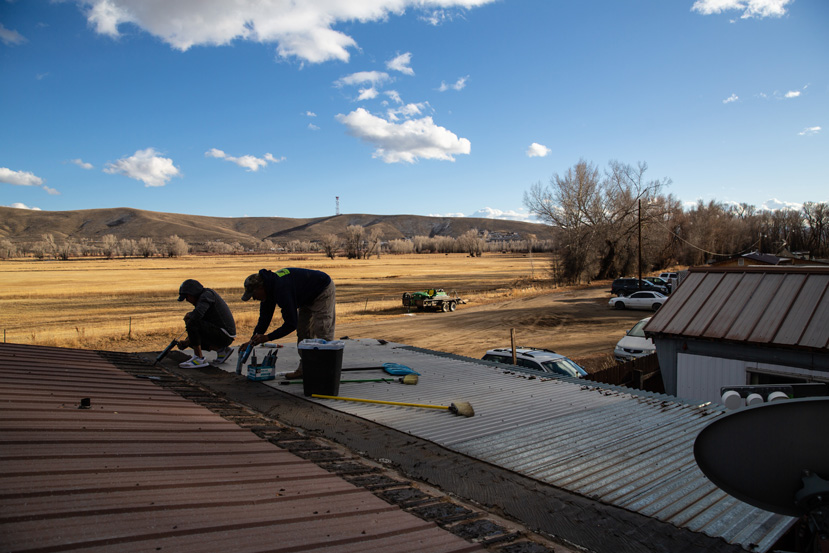
Luna and his son-in-law fixed the roof of Luna’s home in 2020 after a tree fell on it during a storm.
That was the situation in Country Meadows, where many trailers date from the 1970s and would be too fragile to relocate, leaving residents with few alternatives. In an effort to force Hemmert to address the health and safety issues in the park, a group of 32 residents lodged a complaint with the Colorado Department of Local Affairs’ Division of Housing against Hemmert and Adam Hamilton, the park manager, for violating the Mobile Home Park Act.
After investigating, the division found Hemmert guilty of six violations, including failing to properly maintain utility service lines, roads and trees in the park; failing to properly notify residents prior to water service disruptions; and threatening residents with eviction for not signing a new lease. According to the Division of Housing, Hemmert owed more than $13,000 to Country Meadows residents. He is currently appealing those violations.
***
In June 2021, Country Meadows was listed for sale with a pending offer for $2.9 million. Though state law requires that owners notify residents when a park is up for sale, McGee said she never received any paper notification. She found out, like most people, in August, via a posting on Facebook. (Multiple attempts to reach Hemmert and his agent, Brian Meegan, were unsuccessful.)
Mobile home park sales have become increasingly common in recent years as Colorado’s housing market has soared, transforming what were once mostly mom-and-pop enterprises into lucrative investments for private equity firms and other corporate owners. Frank Rolfe, a prominent mobile home park investor based in Missouri, cofounded a website called Mobile Home University offering online courses, manuals and other resources for buying mobile home parks.
The website reads like a primer for profiting from the millions of low-income people struggling to afford a place to live. “With over 20% of Americans trying to live on $20,000 per year or less, the demand for mobile homes has never been higher,” the site reads. “And the big winners are the owners of the mobile home parks where those customers reside.”
A promotional video on the Mobile Home University website describes the many advantages of this power dynamic: “The customers are relatively easy to please. They’re just happy to have a roof over their head.”
The residents of Country Meadows, however, were not so obliging. In recent years, a new model for mobile home park ownership has emerged from ROC USA, a national network of nonprofits and community development financial institutions, to combat the exploitative relationship between many mobile home park owners and residents. With a loan from ROC USA, mobile home park residents can buy their mobile home park and run it as a cooperative. Once the loan has been paid off, ROC USA communities are often able to lower the lot rent that residents pay because they’re not trying to profit from the investment. This approach has recently proven successful at mobile home parks in Boulder County, Durango and elsewhere in the state.
For William Edwards, a Gunnison-based attorney, the ROC USA model has a lot of advantages when it comes to addressing Colorado’s affordable housing crisis. Crucially, it’s not a subsidy—residents buy their park through a loan from either a county or municipal government or a nonprofit, and gradually pay it off like a mortgage.
“Compared to other affordable housing efforts, this puts the most control in the hands of the residents and involves the least amount of government intervention,” said Edwards.
In August 2021, Luna and several other Country Meadows residents began organizing community meetings to discuss their options. Under Colorado’s Mobile Home Park Act as amended in 2020, along with additional legislation passed the same year, they had 90 days to submit a counter-offer to purchase the park. The law also gave a county or other local government entity the right to make an offer on a park on behalf of residents. With the clock ticking on their 90-day window, the group of Country Meadows residents went to the Gunnison County Commission at the beginning of September, asking for help in financing an offer on the park.
The county commissioners were receptive to the idea; the sale threatened a large segment of the town’s scarce affordable housing stock and upwards of 250 people lived in Country Meadows, including many families. First, Country Meadows residents would have to form an official homeowners’ association that could represent a majority of residents in the community so the county could submit an offer on their behalf. On Aug. 10, a group of seven residents spearheaded the O.N.E. Association, an acronym for Organización de Nuevas Esperanzas (in English, Organization for New Hope), enacting bylaws, a board of directors, and Luna as president.
Actually submitting an offer, however, proved increasingly difficult. Hemmert never responded to the county’s repeated requests for information about the park and insisted that the commissioners carry out all correspondence via mail. With just 90 days to submit their offer, it was a convenient way to run down the clock, said Liz Smith, a Gunnison County commissioner. “We sent overnight certified letters but never received a response,” she added. Without the necessary information, the county was unable to submit an offer.
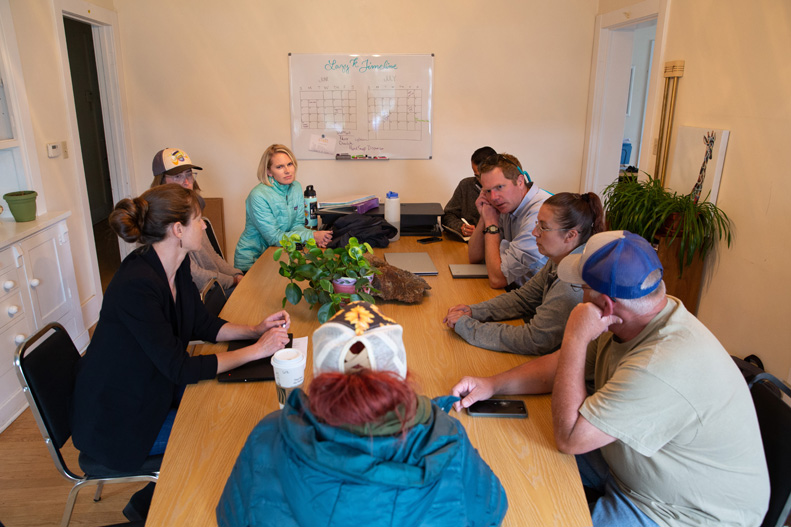
Members of the O.N.E. homeowners association at Country Meadows meet with Gunnison County Commissioner Liz Smith (back left) and attorney William Edwards (second from back right) to discuss their rights as park tenants. June 2022.
O.N.E. kept hosting community meetings for Country Meadows residents, but months passed and there was no word on whether the park was still under contract. In April 2022, ROC USA’s Colorado affiliate, Thistle, a Boulder-based affordable housing nonprofit, decided to put together an offer. Andy Kadlec, Thistle’s program director, said he would set the offer at $2.95 million—on par with the existing outside offer—keeping the rent to around $495 per lot (just $45 more than the existing rate).
O.N.E. held two separate community meetings to discuss the planned offer with residents. McGee, who had recently been nominated vice president of the O.N.E. board, felt proud watching residents talk to Kadlec, ask questions, and mingle with each other. All the hard work O.N.E. had put in on behalf of their community, she thought, was finally paying off.
But before Thistle had a chance to finalize the offer, residents woke up one day to the notice that the park had been sold. Luna and the rest of the O.N.E. board members met with Kadlec, Annie Beall, Thistle’s program specialist, and Ricardo Esqueda, an interpreter for the City of Gunnison, to discuss the news. “I’m sorry, Gregorio,” Beall told Luna.
***
That failure to complete the purchase of Country Meadows revealed some of the shortcomings in the 2020 Mobile Home Park Act legislation. Although the law gave mobile home park residents the opportunity to make an offer on the park if the landlord anticipates selling it or changing the land use, in practice, the opportunity has proven difficult for communities to take advantage of. The original 90-day period for residents to submit an offer was not a lot of time to organize a homeowners’ association, find a lender and put together a complex real estate proposal.
“It’s a very tough ask for a brand-new resident group,” said Kadlec. Not only that, landlords are not legally obligated to accept the offer from the residents, or even consider such an offer in good faith.
Earlier this year, a bill bolstering protections for mobile home park residents passed. The law addresses some of the flaws in the previous iteration of the Mobile Home Park Act, for instance extending the timeline for submitting an offer to 180 days and giving a right of first refusal to local governments or another public entity purchasing a mobile home park on behalf of residents.
Advocates were also pushing for a rent stabilization component that would have limited rent increases to 3% or the rate of inflation (whichever is higher), but ultimately, Gov. Jared Polis reportedly told bill sponsors that he’d veto the bill if it included the rent stabilization piece, so lawmakers omitted it.
Smith, the county commissioner, admitted it was a tough needle to thread—preventing owners from jacking up the rent to whatever the market can bear, while allowing owners who have kept rents reasonable to make the necessary improvements to their properties. Still, the news that the new Country Meadows owner had raised the rent by 70% troubled her: “Where are people going to get an extra $300 a month from?”
***
In late May, I sat in the sunny yard outside McGee’s home. She and her boyfriend, Wes McGee (the two were formerly married), were in the middle of home renovations. Tarps covered the back part of the house and lumber was piled in front of the yard. When they learned about the rent increase, they had contemplated leaving Country Meadows, but where would they go? The two affordable housing developments in Gunnison have years-long waiting lists and according to Smith, even people with Section 8 housing vouchers can’t find a place to use them in town.
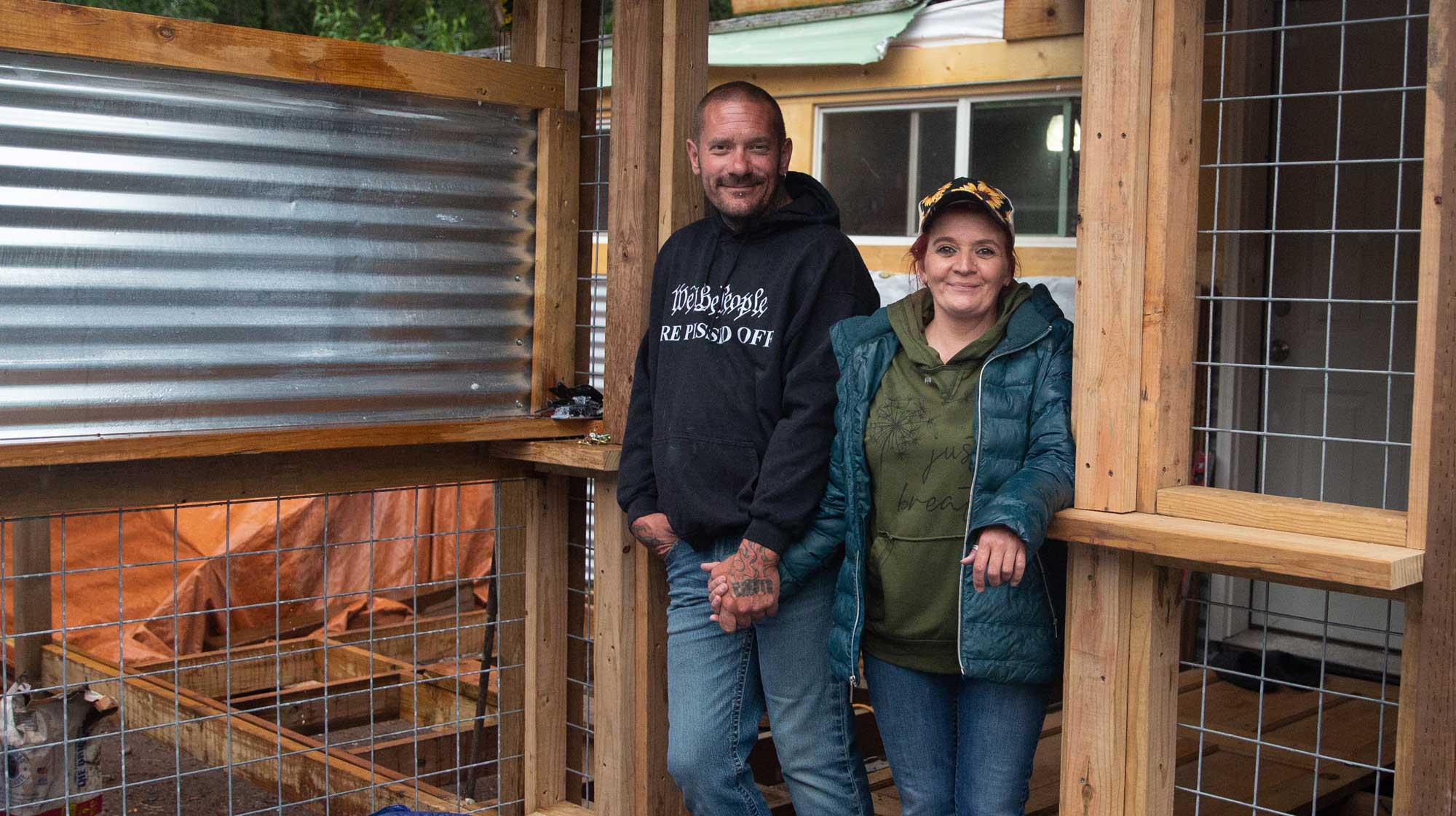
Elizabeth McGee and her boyfriend Wes McGee at their home in Country Meadows Mobile Home Park in June 2022.
At least she and Wes have jobs, but McGee worries about how all the Country Meadows residents living on fixed incomes will cope. Her mother relies on Social Security disability payments and lives with McGee’s sister in Country Meadows, which helps reduce costs, but others don’t have that family support. Already, said McGee, five people had put their trailers up for sale because they couldn’t afford the new lot rent. One man told McGee he sold his for $9,000 and would have to leave town because there was nowhere else he could afford in Gunnison.
For Luna, the news about the rent increase has caused similar anxiety. He hasn’t been able to work for a year and the pain in his back, and now his neck, prevents him from sleeping more than three to four hours a night. He tried to apply for disability insurance, but was told that since his pain was from a workplace injury, he’d have to apply for workers’ compensation instead. But his employer refused to sign off on the claim, saying it was an age-related condition. When he tried to apply for unemployment, he was also denied. Luna helps his wife Pilar clean their church when he can, which nets them roughly $520 every month. Pilar also sells tamales and their kids help with what they can.
Despite everything, Luna is optimistic about the future. Thanks to O.N.E.’s efforts, residents are organized, now; they’re more unified; and they have a way to make their voices heard. They will fight back against the rent increase, he said. On June 30, O.N.E. sued Romero for failing to remedy the health and safety issues in the park, violating the Mobile Home Park Act. The lawsuit mentions that several residents did not have running water or only intermittent water from June 3-10.
Back in May, McGee had finally managed to get hold of Romero, the new owner. Why, she asked him, did he raise the lot rent so much when Thistle’s offer on behalf of the residents would have resulted in just a $45 rent increase?
According to McGee, Romero said the O.N.E. offer was so residents could own the park; they weren’t looking to profit from the investment. “I’m about the profit,” he said.